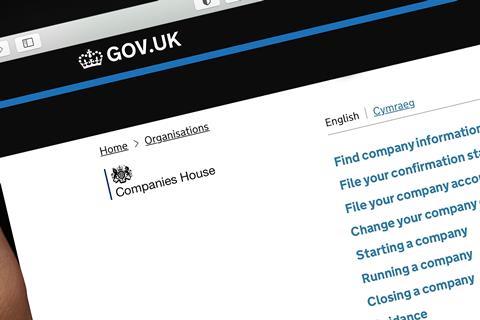Businesses will no longer be able to provide differing versions of their fortunes to Companies House and HM Revenue & Customs under long-awaited reforms to company registration proposed yesterday. The transformation of Companies House from a 'passive administrator to more active gatekeeper' is set out in a white paper on corporate transparency published yesterday as part of the government’s crackdown on the laundering of overseas dirty money.
Under the proposed changes, the registrar will have powers to query suspect submissions and share data with other agencies. Financial data will be held in the same format as that used by HM Revenue & Customs so that discrepancies will quickly show up. The new powers will also make it easier to identify 'phoenix' companies.
According to the paper, the changes will comprise the most fundamental change to the register of companies’ purpose and role since its creation in 1844.
Under fhe reforms:
- All entities registered at Companies House will have at least one fully verified natural person directly associated with them on the public register.
- The registrar will have powers to query suspicious appointments or filings and request further evidence or reject the filing.
- Companies House will have more extensive legal gateways for data sharing with law enforcement, other government bodies and the private sector.
The white paper admits that the current system of business registration is woefully open to abuse. In the foreword, business minister Lord Callanan states that ‘recent years have seen this framework manipulated, particularly in the use of anonymous or fraudulent "shell" companies and partnerships. These provide criminals with a veneer of legitimacy to help commit a range of crimes, from grand corruption and money laundering to fraud and identity theft’.

Numerous well-known loopholes are listed in the paper. It notes that parties based overseas and not subject to UK money laundering regulations are permitted to form UK companies and that it is possible to register an appointment without the knowledge or consent of the person being registered.
Meanwhile 'it is not untypical to find that the company has claimed a stronger financial position in its Companies House filings in order to impress stakeholders, whilst stating a less strong position in its returns to HMRC in order to reduce its tax liability’.
Current controls on phoenix trading - where a business transfers its assets but not its debts to a company with a similar name and common directors - apply only if misconduct is identified under the insolvency regulations, the paper notes.
The paper sets out a programme under which Companies House 'will transform every aspect of its skills, culture, operating model, and services'. This will cost £63m by April 2025, on top of £20m invested in 2021-22.
Under the changes, 'the vast majority of individuals incorporating or filing with Companies House' will have to verify their identities with official documents checked against the holder’s biometrics. If an individual fails to verify, this will be noted on the public register, enabling anyone contemplating doing business with them to make their own assessment of risk.
In another move to greater transparency, all small companies will be required to file a profit and loss account and all accounts filed with Companies House will have to be in a digital format using the industry standard iXBRL mark-up language to make them machine-readable.
However the white paper reveals that the government has shelved the idea of cutting the time allowed for the filing of accounts from nine months after the end of the reporting year for a private company and six months for a public company, citing the challenges of the pandemic.





























4 Readers' comments